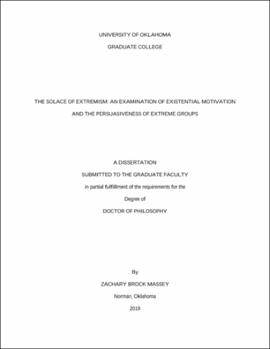| dc.description.abstract | This dissertation examines the persuasive appeal of extreme groups under conditions of self-uncertainty. The guiding theoretical framework, uncertainty-identity theory (UIT; Hogg, 2007) argues self-uncertainty motivates people to identify with social groups. In this regard, UIT also considers properties of groups, arguing those high in entitativity (i.e., who tend to be rigid and uncompromising) are extreme in nature, and also more attractive to self-uncertain individuals. Given debate within the literature as to whether liberals or conservatives are more prone to identify with extreme groups (Jost & Napier, 2012), ideological congruence between group (sender) and participant (receiver) is also a factor in this research. The experimental study presented here (N = 423) applies a 2 (group extremism: moderate vs. extreme) × 2 (self-uncertainty: certain vs. uncertain) × 2 (ideological congruence: congruent vs. non-congruent) independent groups design.
Altogether, results point to three general conclusions. First, UIT was supported, with self-uncertainty showing a main effect across all outcome variables. Second, self-uncertainty interacted with group extremism, resulting in more favorable attitudes toward positions advocated by an extreme group, as well as more perceived goodwill from the extreme group leaders. Third, ideological congruence between sender and receiver only affected behavioral intentions for liberals and not conservatives. Additionally, the two-way interaction between ideological congruence and group extremism showed greater preference for a moderate congruent group and not an extreme one. Finally, an unexpected main effect for group extremism points to the need for greater scrutiny of source credibility outcomes in future research. | en_US |
